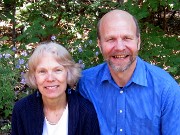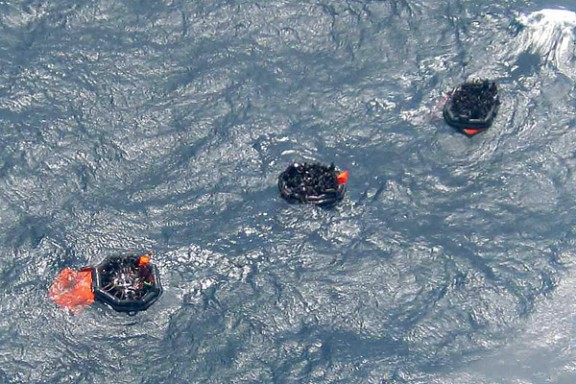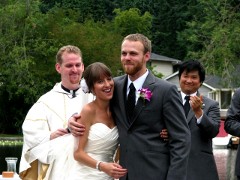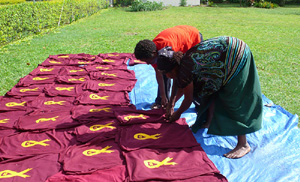Dav and Anne-Marie get married!
Archive: Aug 2012
Hot off the press... Dav and Anne-Marie get married. See below or head immediately to our photo gallery:
Discovering Your Language
Making Vernacular Dictionaries. Few of us really realize the tremendous work that goes into making a dictionary in your language, and yet this is the very first step that communities in PNG have embarked upon, in an effort to document their own language. We recently hosted a workshop and visitors from all over the country came to learn the latest software tools to help do this very task.
 The greatest missionary is the Bible
in the mother tongue. It needs no furlough and is never
considered a foreigner.
The greatest missionary is the Bible
in the mother tongue. It needs no furlough and is never
considered a foreigner. 
— William Cameron Townsend, founder, Wycliffe Bible Translators
Preserving Culture is Important. In this fast-paced world the term "Globalization" has come to mean "decimation of indigenous cultures". And technology is often associated with that rapid change. But here we can see how modern technology can actually counteract the forces of change by a rapidly encroaching "outside world". The elders in a culture worry incessantly that their cultural knowledge is about to be lost in the next generation. Making a vernacular dictionary is but one way to preserve a good legacy for succeeding generations, and even at times "re-vitalize" a language and culture for the future. A way to face, head-on, pressures towards extinction.
The National Dictionary Workshop
Tege Tandagua and Henny Hayabe -- Huli Men (sans wigs and face paint)
who proudly show off their latest accomplishment, a 68 page "Picture
Dictionary". These books may be a "first" for the Huli language.
The purpose of the course was to teach national colleagues principles
of dictionary making, help them start or continue a lexical database
using specially a designed program called WeSay, and produce a picture
dictionary.
The participants came from the Ngaing (3), Nankina (3), Awad-Bing (3),
Huli (2), Somsi (2), Agarabi (2) and Benabena (1) languages. They came
on their own resources, and their communities provided the funds for
transportation and housing while staying at our National Training
Centre.
Brian stood ready in technical support since some of the teams had
brought older dictionaries transcribed to a computer format, but often
these "langauge databases" were not in a suitable form for importation
into the WeSay Dictionary software program. This meant grabbing a
bunch of text oriented manipulation tools on the computer and then
doing a series of necessary transformations to the data. Each language
was different, and they creatively challenged us to work out a new
solution each time.
The "Picture Book" format has a bunch of pre-drawn pictures from an
existing library of more culturally relevant objects. If one is
deciding to do a trigot version, then three languages
are often translated: Vernacular (Huli at right), Tok Pisin and then
finally English.
Sometimes there are special non-European characters in the language
and we must design a custom keyboard in advance of the course. How a
group expresses certain sounds could be quite different that what we
are used to in our Western societies.
One very popular character in PNG cultures is the "velar nasal" or the "eng" character (ŋ) and normally could be a challenge to type without a custom computer keyboard. How a language is written is often called an "orthography" for the language.
5 If you need wisdom, ask our generous God, and he will give it to you. He will not rebuke you for asking. 6 But when you ask him, be sure that your faith is in God alone. — James 1:5-6 (NLT)
We praise the Lord for adequate technical preparation before coming to Papua New Guinea to know better how to help indigenous cultures to be better equipped to come and join us in the work. Making computers and their technologies more accessible can be a rewarding experience for all.
 If you want to go fast, go alone. If
you want to go far, go with others.
If you want to go fast, go alone. If
you want to go far, go with others.
 — African Proverb
— African Proverb
Off course if we wanted to just document languages for ourselves (for
the benefit of the outside world) we could just send in the reseachers
and make vernacular dictionaries for ourselves. That's not really
going to work in the long-run when one considers the 2000 or so
remaining minority languages in the world and the speed by which they
are all dying out. We must train local communities to help themselves
and give them the tools by which they can preserve their own language
and culture.
News about the Kwina Church
Around two years ago we reported that a new village community called Kwina, invited our church to come and do a "start-up". See Kwina. So after a longish furlough where we are now back in the Aiyura valley. "How are they doing?", you might ask.
Well, I wish I could say that all is well. Yes, they still meet together and there is a church presence, but you see there is a profound "unresolved" conflict between the members of the Kwina community and the main Ukarumpa village, where our local church resides. What troubles us is the lack of teaching within the churches to resolve community hurts and differences between members.
This is not an argument about theological positions in the faith. This has to do with clan rivalries and the things that make for anger, revenge killings and wars. I don't believe that Christ calls us to stand by and not influence our local communities toward peace and reconciliation with our neighbors. It does not really matter the nature of the crime, or the long history involved. Knowing Christ is always about "transformation" in Him.
34 So now I am giving you a new commandment: Love each other. Just as I have loved you, you should love each other. 35 Your love for one another will prove to the world that you are my disciples.. — John 13:34-35 (NLT)
So, if you have managed to read this far down this page then ...
Pray: That God's Spirit of Truth and Peace will prevail
particularly within church members in their respective villages, and
even across to the non-believers within the two communities. It is
time for one and all to sit down and embrace one-another as brothers
and sisters. To be of one mind, before the Lord. And Christ followers
we are indeed called to be change agents, and not really to be
uninvolved in the life of our local communties.
Insights into Papua New Guinea Life
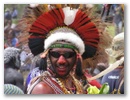 Here is the
entrance to our photographic favorites. Come journey to the "land of
the unexpected" as seen in our eyes after 20 years of ministry in this
fair country.
Here is the
entrance to our photographic favorites. Come journey to the "land of
the unexpected" as seen in our eyes after 20 years of ministry in this
fair country.
See
More from Years 2005 to 2011»
Higher Resolution Photos are freely available upon request. Just email and let us know what you would like.
You will show me the way of life, granting me the joy of your presence and the pleasures of living with you forever.
— Psalm 16:11
